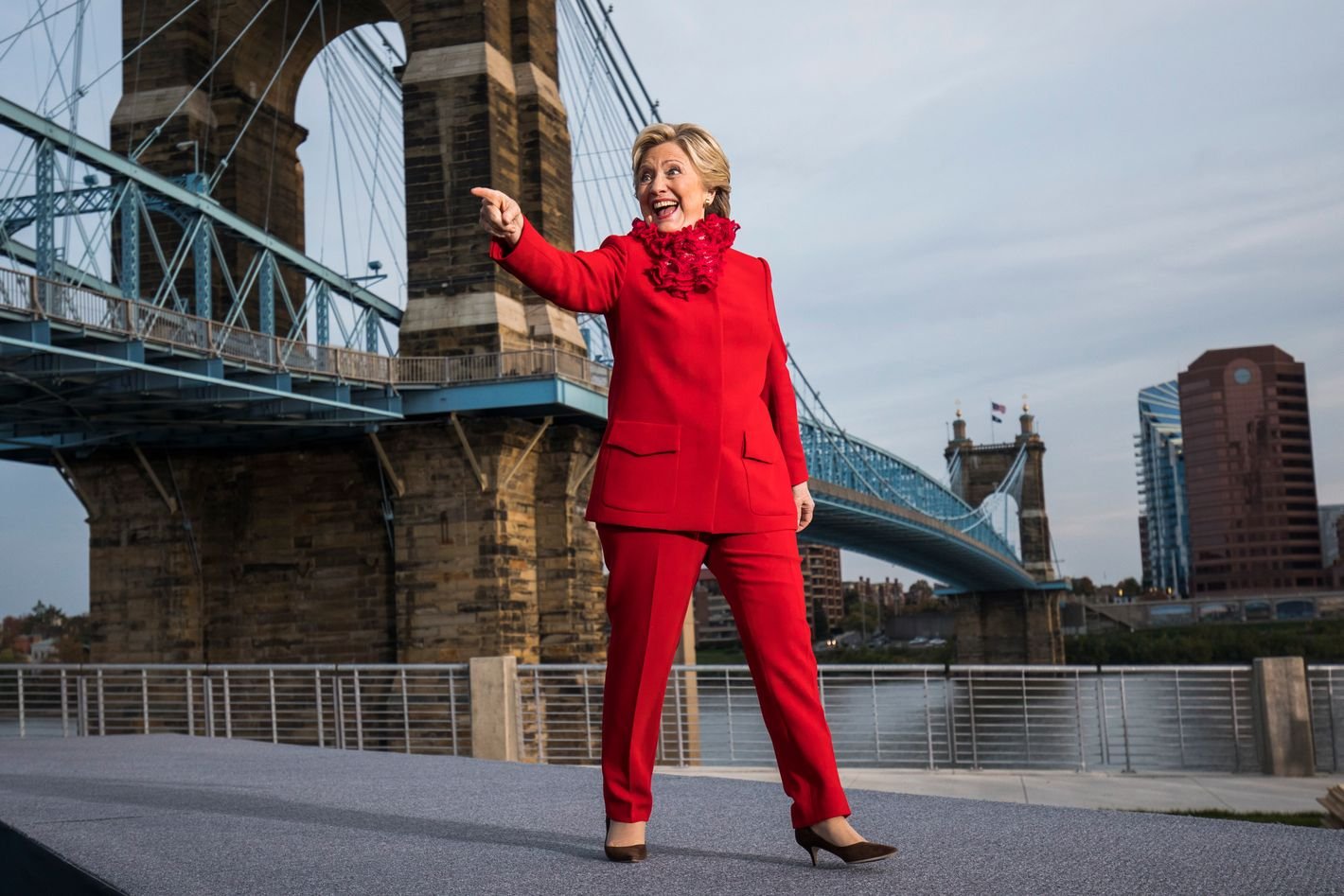Photo: Brooks Kraft/Getty Images
We’re just a few days away from the most consequential election of our lifetimes. And the most consequential consequence of all is, undoubtedly, how the results will affect the Academy Awards race.
As we like to say, the Oscars aren’t just about what’s onscreen. They’re dependent on industry narratives, a film’s momentum, the elusive notion that it’s their time for a given individual — all of which we duly analyze. But another underrated factor is how vibes in the wider culture influence the awards landscape. The most infamous example came in the Oscar race eight years ago, which was upended halfway through by the election of Donald Trump. Movies like Moonlight and La La Land premiered in one vision of America, then suddenly found themselves competing for trophies in another. More subtly, ensuing controversies around Jussie Smollett and Covington Catholic may have helped voters brush off the online furor over Green Book, and the sour mood created by the failed impeachment a year later probably contributed to the Academy’s willingness to embrace a film as cynical as Parasite.
Of course, it is possible to overstate the impact of outside events, as I know from wrongly predicting that January 6 would doom Glenn Close’s chances of getting nominated for Hillbilly Elegy. Still, for this special election edition of Gold Rush, I thought it would be fun to unplug from present-day anxieties. Rather than speculate on how a Trump win could boost Anora’s chances — something I don’t think any of us have the energy for right now — let’s travel back in time to the fall of 2016, and enter an alternate universe where 12,000 Wisconsinites shifted their votes from red to blue. (Let’s say they all went to see The Girl on the Train and were reminded of the importance of Trusting Women.) Taking a page from my colleague Joe Reid’s book, here’s what happens to awards season in the mirror universe where Hillary Clinton wins the election instead.
La La Land wins for real.
In our timeline, Moonlight’s surprise Best Picture win came during the traumatic opening weeks of the Trump presidency, which likely helped rally voters to its side. In a world where Clinton pulls through, I think the race turns out a lot closer to the consensus pre-election view, which held that La La Land was the dazzling cinematic achievement, while Moonlight was a tiny gem that could hopefully find wider recognition. Thus, when Warren Beatty and Faye Dunaway announce La La Land as the winner in this timeline’s 2017 Oscars, they’re not making a mistake: Damien Chazelle’s musical really has won Best Picture, and producer Fred Berger gets to finish his speech. Meanwhile, as time goes by, Moonlight’s reputation as an overlooked classic gets ever stronger.
Conversely, with no need to serve as a post-election security blanket, Arrival has far less cultural impact. Denis Villeneuve still gets the Dune gig, but after the failure of Blade Runner 2049, he lacks the cachet to demand the story be split into two films. He struggles to condense the material, and Villeneuve’s Dune winds up a fascinating misfire with an incredibly rushed final act.
Three Billboards is less of a thing.
I don’t know if it’s correct to suggest, as The Good Fight once did, that a world where Clinton wins is also one where Harvey Weinstein never receives his comeuppance. But I do think that, without a confessed pussy-grabber in the White House, the Me Too movement looks very different. Perhaps it’s more a slow drip-drip of revelations about individual bad men instead of the full-scale cultural reckoning we saw in the fall of 2017. Therefore, when Martin McDonagh’s Three Billboards Outside Ebbing, Missouri arrives onto the scene, its themes resonate less than they did in our timeline: The story of one woman’s fiery protest against powerful men doesn’t hit as hard now that a woman’s in power. Instead of sweeping the season, Frances McDormand winds up locked in a threeway Actress race with The Shape of Water’s Sally Hawkins, who wins the BAFTA, and Lady Bird’s Saoirse Ronan, who wins most of the critics’ prizes. On Oscar night in 2018, the prize goes to Ronan, continuing the Obama-era trend of ingénues winning Best Actress. Ronan does not close her acceptance speech with the phrase “inclusion rider,” so SEO bloggers get a few extra hours of sleep that night.
As there’s less buzz around McDormand’s performance, the backlash against Three Billboards’ handling of police brutality kicks in earlier, and for longtime character actor Sam Rockwell, the nomination itself becomes the win. Instead, The Florida Project’s Willem Dafoe cruises to a career-achievement victory in the Supporting Actor race, and all the rise-of-A24 trend pieces that didn’t get written when Moonlight lost Best Picture get written now instead. This also means that Woody Harrelson doesn’t get his coattail nomination, and the fifth Supporting Actor spot goes to none other than … Call Me by Your Name’s Armie Hammer!
With the nation’s white liberals unchastened, Get Out receives zero nominations. However, The Shape of Water still wins Best Picture. In every timeline, people love it when she fucks the fish-man.
Barry Jenkins and Glenn Close finally get their due.
Two years after its release, Moonlight has become the consensus top pick in listicles naming the best films to lose Best Picture. Anticipation is high for Barry Jenkins’s follow-up, If Beale Street Could Talk, which wins the People’s Choice Award at TIFF. Green Book premieres at the same festival, but its message about looking past each other’s differences feels less pressing in a world where Donald Trump has not just nominated Brett Kavanaugh to the Supreme Court, and response to the interracial buddy dramedy is muted. Beale Street rides its early momentum to a Best Director win for Jenkins, though once again he’s pipped at the finish line. A smaller Me Too movement means Academy members have fewer qualms about voting for a Bryan Singer movie, so they are free to follow their hearts and award 2019’s top prize to their beloved Bohemian Rhapsody.
In a bid to recreate the success of “Pokémon Go to the polls,” president Clinton comes out in favor of the Academy’s plan to create an Oscar for the “Best Popular Film.” This does not stop the organization from scrapping the idea, nor the Democrats from suffering a disastrous midterm defeat. In this light The Favourite, a satire about an incompetent female ruler, is greeted very differently. The Best Actress race becomes a psychological re-staging of the 2016 Democratic primary: The Bernie contingent goes gaga for Olivia Colman, while centrists rally around The Wife’s Glenn Close, who is seen as an even more obvious Hillary stand-in than she was in our universe. On Oscar night, the Hollywood Establishment circles the metaphorical wagons around the embattled president, ensuring that, after seven nominations, Glenn Close finally gets her Oscar!
An Utterly Twisted Result.
By year three of the Clinton presidency, the Best Picture trophy has gone to a couple of movies about women and queer people. You know what that means — is it time for straight white men to have a comeback? Coincidentally or not, all of the top contenders in 2020 are male-focused movies: 1917, Ford v. Ferrari, The Irishman, Joker, and Once Upon a Time in Hollywood. Since liberal journalists have not been negatively polarized against Joker by the daily insanities of the Trump era, Todd Phillips’s film winds up sweeping the Oscars, taking Picture, Director, Actor, Adapted Screenplay, Score, and Costume Design. Parasite, a modest box-office success out of South Korea, wins Foreign Language Film.
This brings us to the onset of the COVID-19 pandemic, at which point the issue of who’s in the White House is less influential on the Oscar race than, you know, everything else that happened. Still, we can be sure that there would not be a Hillbilly Elegy movie, which means there’s an open seat in the 2021 Supporting Actress race — hello, Jodie Foster in The Mauritanian! Anyway, I hope you’ve enjoyed this little exercise. Next time, let me explain how CODA doesn’t win Best Picture if Vladimir Putin doesn’t invade Ukraine.
Oscar Futures: Can Wicked Defy Gravity?
Every week between now and January 17, when the nominations for the Academy Awards are announced, Vulture will consult its crystal ball to determine the changing fortunes in this year’s Oscars race. In our “Oscar Futures” column, we’ll let you in on insider gossip, parse brand-new developments, and track industry buzz to figure out who’s up, who’s down, and who’s currently leading the race for a coveted Oscar nomination.

